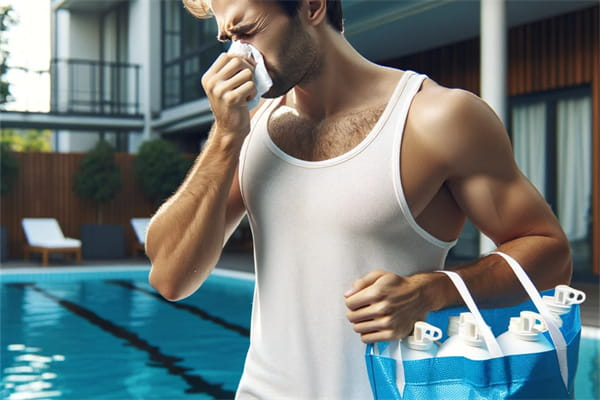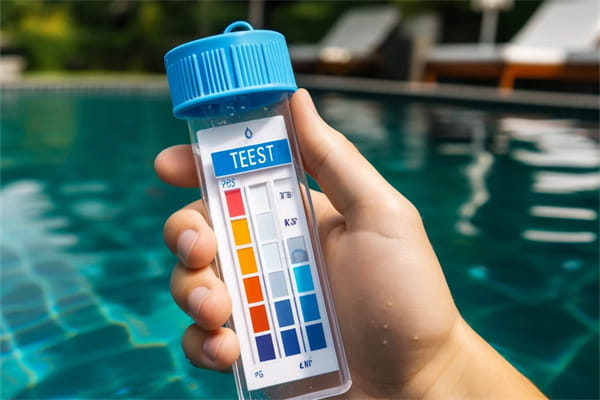Maintaining a clean and safe swimming pool is essential, and chlorine tablets are a go-to solution for many pool owners. But what happens if you put too many chlorine tablets in your pool? Over-chlorination can lead to a variety of problems, from irritating swimmers to damaging your pool equipment. Let’s dive into the signs, effects, and solutions for handling an overly chlorinated pool.
Ⅰ. Signs Your Pool Has Too Many Chlorine Tablets
Using chlorine tablets is a simple and effective way to keep your pool water sanitized, but it’s easy to go overboard. Here are some clear signs that your pool has too many chlorine tablets:
1.Strong Chlorine Smell:
While a faint chlorine smell is normal, an overpowering chlorine odor is a red flag. It indicates that there’s too much chlorine in the water.

2.Irritated Eyes and Skin:
If swimmers complain of burning eyes or itchy skin, it’s a sign that the chlorine levels are too high. Chlorine tablets are meant to disinfect, but excessive amounts can cause discomfort and irritation.
3.Faded Swimsuits and Pool Toys:
Over-chlorination can lead to bleaching of swimsuits and pool toys. If you notice colors fading faster than usual, it might be due to too many chlorine tablets.
4.Cloudy or Discolored Water:
High chlorine levels can make your pool water appear cloudy or off-color. This is not only unappealing but also indicates an imbalance in the water chemistry.
5.Balancing Other Chemicals is Difficult:
When there are too many chlorine tablets in your pool, it becomes challenging to maintain other chemical levels, such as pH and alkalinity. This imbalance can lead to further complications.
Ⅱ. Effects of Adding Too Many Chlorine Tablets to Your Pool
Now that you know the signs, let’s explore the consequences of over-chlorinating your pool with too many chlorine tablets:
1.Health Risks:
High chlorine levels can pose serious health risks. Prolonged exposure to over-chlorinated water can cause respiratory issues, especially for those with asthma or allergies. Additionally, it can lead to more severe skin reactions and eye irritation.
2.Damage to Pool Equipment:
Chlorine is a powerful chemical, and too many chlorine tablets can cause corrosion and damage to your pool equipment. Liners, filters, and pumps are particularly vulnerable. Replacing these parts can be costly and time-consuming.
3.Water Imbalance:
Chlorine tablets are just one part of maintaining a balanced pool. Excessive chlorine can disrupt the overall water chemistry, making it difficult to manage pH, alkalinity, and cyanuric acid levels. An imbalanced pool can lead to further issues like scaling and cloudy water.

4.Environmental Impact:
Over-chlorination can also have negative effects on the environment. When pool water with high chlorine levels is drained, it can harm local flora and fauna. Proper disposal and dilution are crucial to minimize environmental damage.
Ⅲ. How to Fix an Over-Chlorinated Pool
If you’ve accidentally added too many chlorine tablets to your pool, don’t panic. There are several steps you can take to bring the chlorine levels back to a safe range:
1.Stop Adding Chlorine Tablets:
The first step is to stop adding any more chlorine tablets. Allow the chlorine levels to naturally decrease through use and evaporation. Regularly testing the water will help you monitor this process.
2.Use a Chlorine Neutralizer:
If you need to lower the chlorine levels quickly, you can use a chlorine neutralizer. This chemical reduces chlorine levels and helps restore balance. Follow the manufacturer’s instructions carefully for best results.
3.Partially Drain and Refill the Pool:
Another effective method is to partially drain your pool and refill it with fresh water. This dilutes the chlorine concentration and helps achieve a safer level. Be sure to test the water after refilling to ensure the balance is correct.
4.Monitor Chlorine Levels Regularly:
Prevention is key to avoiding over-chlorination in the future. Use a pool test kit to regularly check the chlorine levels. Aim for a range of 1-3 ppm (parts per million) for residential pools. This ensures your pool remains safe and comfortable for swimmers.
5.Adjust Other Chemicals:
Once the chlorine levels are back to normal, make sure to adjust other chemicals like pH and alkalinity. Keeping these levels balanced is essential for overall pool health and prevents future issues.
Ⅳ. Conclusion
Chlorine tablets are an essential tool for keeping your pool clean and safe, but using too many can lead to a host of problems. From health risks and equipment damage to water imbalance and environmental impact, over-chlorination is something to avoid.
Remember to use chlorine tablets in moderation, regularly test your pool water, and adjust chemical levels as needed. Have you ever experienced over-chlorination in your pool? Share your stories and tips in the comments below!





